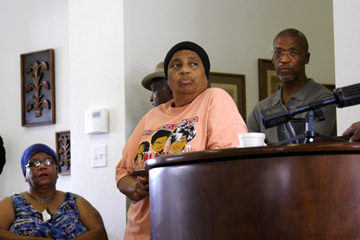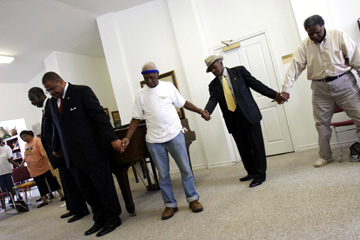 Charmion Polk, left: ‘We want answers as to why it happened in the first place.’
Charmion Polk, left: ‘We want answers as to why it happened in the first place.’
|
 The Rev. Kyev Tatum, fourth from right, and others sing ‘We Shall Overcome’ at the residents’ meeting.
The Rev. Kyev Tatum, fourth from right, and others sing ‘We Shall Overcome’ at the residents’ meeting.
|
|
A D V E R T I S E M E N T
|
|
|
|
A D V E R T I S E M E N T
|
|
Behind on the Bills
The city’s failure to pay
on time is causing problems for Eastside senior citizens.
By BETTY BRINK
Fort Worth City Council member Frank Moss and city housing official Donald Cager were taken to the woodshed twice last week — in both cases, by a bunch of their elders using wheelchairs, walkers, and canes as well as figurative paddles.
The cause of the oldsters’ anger: the news that the city’s failure to pay its bills was threatening to undermine conditions at the Villas of Eastwood Terrace, a gated senior apartment complex that has been hailed as one of the successes of the city’s housing department.
But now, because the department has fallen behind, reportedly by more than $50,000, in its payments to the company it hired to run the Villas four years ago, the complex’s well-regarded management team may soon be gone and the future of those who live there sent into limbo.
The seniors, however, are not going quietly. At two meetings, more than 100 residents of the complex peppered Moss and Cager with questions and demanded answers.
“The people we love, who are running this place right for the first time since I’ve been here, are about to be gone, and we were not even consulted,” said resident and meeting organizer Charmion Polk. “We want it stopped, we want their jobs saved, and we want answers as to why it happened in the first place.”
The Villas project, which opened in 2003, is owned by the Fort Worth Housing Finance Corp., a nonprofit company operated by the city to provide housing for low- to moderate-income residents. The complex is managed by Dallas-based Hearthside Development/Quest Management. There have been serious problems over the years, but residents said they were solved by Quest’s current onsite management team that took over in March. The new crew, according to Polk, was brought in by a revamped upper management team at Quest specifically to clean up the Villas after the complex had gone through at least three shoddy managers.
Early last week, however, Quest told the staffers they would be laid off and replaced by temporary workers. The reason, Moss and Cager both admitted reluctantly, is that the housing finance corporation had fallen behind in the payments due to Quest under the contract.
Neither Moss nor Cager would say how long the late-payment problem has persisted or how much is owed.
However, a source at city hall, who asked not to be named, told the Weekly that an audit of the project now in progress shows the city to be at least $50,000 and possibly as much as $100,000 behind in its payments.
Dale Fisseler, assistant city manager over the housing department, confirmed that the audit is being done because of Quest’s claims that it is owed “a large amount of money by the Housing Finance Corporation.” He said that if any money is owed, it will be repaid from the finance corporation and not from the city’s general fund.
A Quest employee who asked not to be named said that the company has continued to pay the Villas staff out of its own coffers for at least the last four months. The seniors’ revolt and Moss’ resulting intervention have staved off the firings, at least temporarily.
“Temporary workers won’t care about this place or the people here like this staff does,” Polk said. She called the first meeting, to let residents know what was happening, and invited Moss, who was recently re-elected to the Eastside council seat after a loss two years ago, and Cager, the housing department program manager, to ask for explanations.
Both men pleaded ignorance of the problem. Cager, whose father lives at the complex, said he’d “been on this project since its conception.” Nonetheless, he told residents that he’d found out that the management company action only a day earlier, from a resident.
Moss, whose father lived the last few years of his life at the Villas, said he too was unaware of the change until called by a resident.
Polk is a retired Dunbar Middle School teacher who founded and for 25 years led the Original King’s Kids, a Fort Worth-based group of young African-Americans who tour the country giving the speeches of Martin Luther King Jr. She was openly skeptical of the men’s answers. “I find it hard to believe that you all did not know anything about this,” she said. “What kind of city is this, then? What does it say about how well you are watching out for those who are old and poor?”
Moss’ and Cager’s answers also angered the Rev. Kyev Tatum, an activist whose father, Robert, lives at the Villas. The minister was asked by the seniors to be their advocate at city hall. “We need to take this fight for those who paved the way for us downtown,” he said, “and we will. ... There’s millions sitting in the [city’s bank account] for housing for the poor that’s not being spent. And the housing department isn’t paying its bills. That is just flat-out wrong. We’re going to demand answers.”
After the second meeting, Moss and Cager refused to answer questions about the details of the unpaid debt. “I don’t speak to reporters,” Cager said.
“I don’t speak to your paper,” said Moss.
Following the first meeting, Moss negotiated a freeze on the firings. But there was no promise, he said, that the freeze would be anything but temporary.
That was fine with the jubilant Polk. “Now, we’ve got some time to organize,” she said.
The senior uprising was not lost on other African-American activists. By the second meeting, the retirees had been joined by community organizers Johnny Lewis from the Near Eastside, Melinda Hamilton from the Carver Heights neighborhood, and a number of ministers. “This is an issue we can all come together on,” Lewis said. “It just may have awakened a sleeping giant.”
Ernest Mackey, head of a local LULAC chapter and a member of the city’s Crime Control and Prevention District board, is another long-time community activist who helped organize the protest. “This city treats its poor so badly, across the board, from schools to housing, that we hope this [protest by the seniors] will wake Fort Worth up,” he said. “The housing department is corrupt, and the mayor doesn’t care about anyone but his downtown gang. ... It’s time some of those windfall profits [from the Barnett Shale gas drilling] were spread around to everyone, especially to those who are now elderly and who helped build this town.”
Eastwood Terrace was built by the city in a joint venture with the federal Department of Housing and Urban Development five years ago to fill a badly needed hole in housing for seniors in the Stop Six neighborhood. More than 100 retirees, most of them African-American, live there in well-maintained one- and two-bedroom brick-façade fourplexes amid neatly kept grounds with beds of colorful flowers. Some pay the full monthly rent of $675 plus electricity; the majority qualify for federal housing assistance.
The complex, however, hasn’t always been so well kept or safe. Last year, the grounds “were trashy, we had drug dealers in here, we had young thugs moving in, and we had pimps,” Polk said. “Management turnover was high. They were letting anybody move in just to keep the apartments filled. We even had one preacher here baptizing folks in the swimming pool. Maintenance was a joke, and old folks who didn’t have any family to look after them were just left on their own.
“I can afford to live anywhere, but I want to live here, in this community,” she said. “I made my money here in Stop Six, I’m going to spend my retirement money here.”
Jerry Pointer, who has lived in the complex since it opened, said drug dealers “hid their cars in our parking lot after doing their deals out on the street. Now they’re gone, and we can sit out on our front porches again.”
Calvin Mosely’s mother lives at the Villas, and he volunteers there on a regular basis. “It is just amazing the difference after the new managers came in,” he said. “The whole place seemed to come alive again. People are outside, talking to each other. There’s a real sense of community.”
Residents credit manager Lydia Scott and assistant manager Jennifer Amador with working diligently with police to get rid of the drug dealers, kicking out those who were living there illegally, and bringing in workers who transformed the place into a garden spot.
“I love it out here,” Polk said. She and others praised the staff for “looking out for the old ones,” many of whom live alone. “They make sure they have their medicines, that they are taking their medicines and that they are eating. Lydia drives up and down these streets and keeps an eye on us. We never had a staff like this before.”
Now that they have the city’s attention, Polk said, “We are going to demand even better conditions and demand that the city live up to the promises it made when we moved in.” The things they want are simple, like screens for their front doors so they can open them in nice weather. “Cager said screens would make this place look like a ghetto,” Polk said. Residents were promised free cable, only to find a charge tacked onto their monthly rent bill, she said. Initially, water bills were paid by the city, but the residents were recently notified that they would be paying for that as well.
Polk and others at the meeting tried to give Moss a list of their grievances. He refused to accept them, citing the need to take care of the management issues first. A delegation of the residents brought the list to city hall on Tuesday, to air them before the full council.
“I want to know why the city doesn’t have the money to do what is right for us out here in Stop Six,” Polk said.
 Email this Article...
Email this Article...

